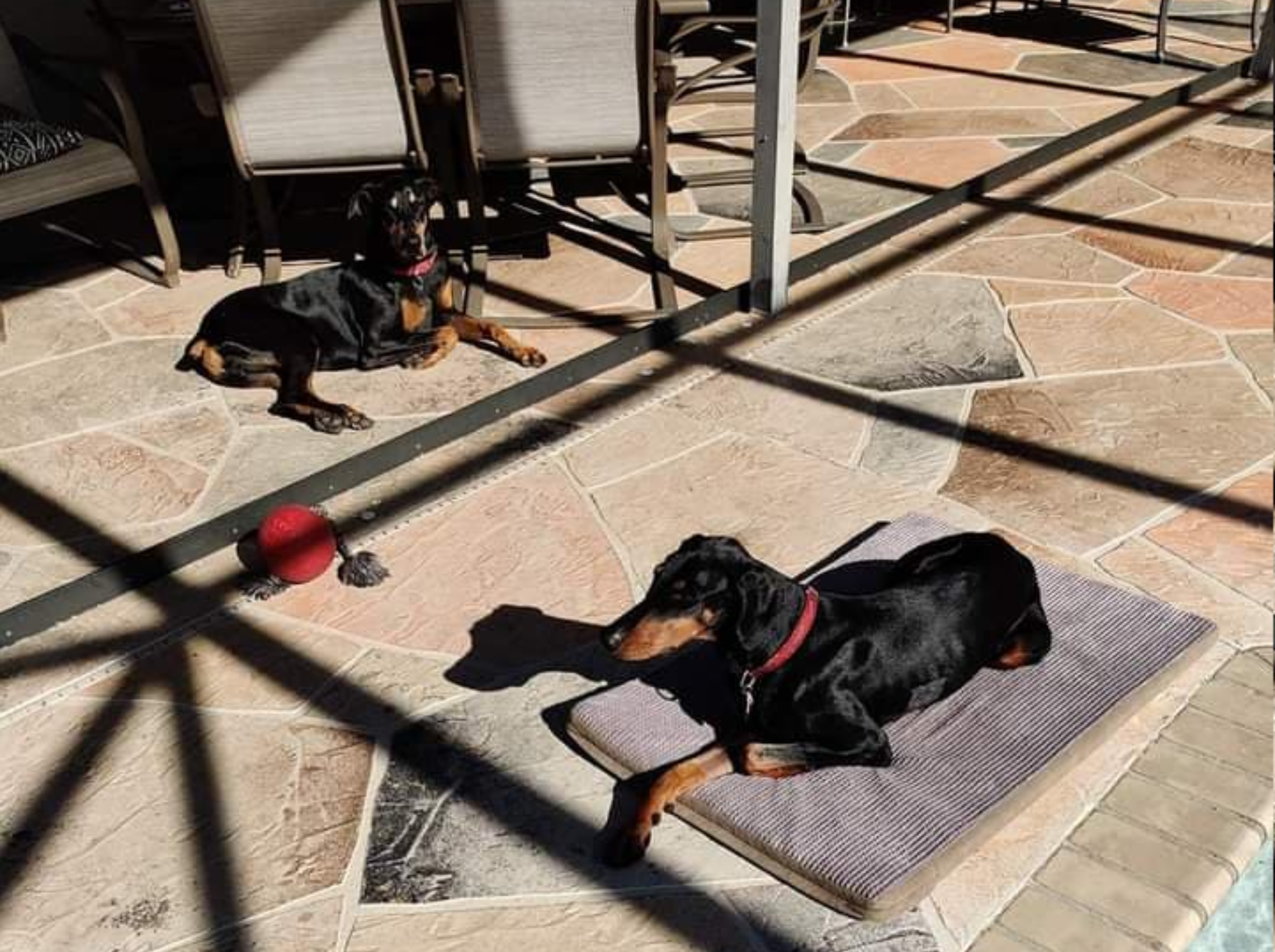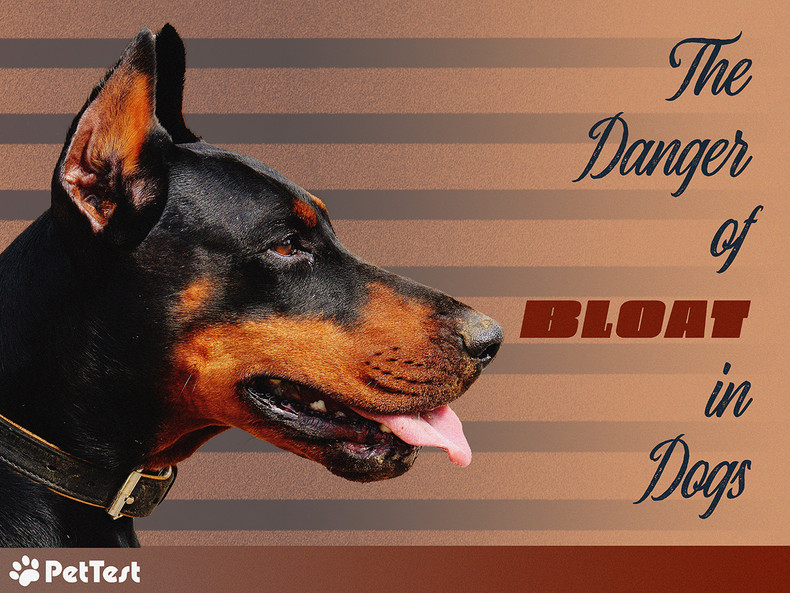The Danger of Bloat in Dog
I hope that everyone had a wonderful holiday and enjoyed a favorite meal, and good company. I had my first Christmas as grandma of a two-year-old who now knows what gifts are…long gone are the days of her loving the wrapping paper and bows. We had a nice and quiet holiday!
Today’s blog is a bit different than my other blogs, I normally talk about all things diabetes, but on Christmas Day I messaged Steven Thuss, the president of PetTest to wish him and his family a happy holiday, and he said that he just taken his rescue Doberman, Macie to the ER hospital because she had bloat. Saturday (12/26) she was able to go home to recover with her family. We want to share the story of what happened with Macie and a brief explanation of just what bloat is and why it is so critical to get immediate medical attention for any dog with bloat.
Steven and Macie’s Story
“It all happened in 15 minutes. One minute she was running around playing in the house with her Christmas toys and the next minute she was backed into a corner shivering and apprehensive. She started drooling excessively and then dry heaving, but nothing would come up. At one point I thought that she might be choking. I quickly took the trash out and by the time I got back in the house, her stomach started ballooning, and I knew exactly what it was, bloat. I tried to get Macie into the car, but she could not use her rear legs at all, so my son and I carried and set her in the back seat of the car, my daughter sat in the back with her to keep her comfortable. I called the ER vet on the way there because I knew that time was against us, the swelling in her stomach was getting worse and she was crying in pain. As soon as we got to the ER vet they immediately took her back and used a large needle to decompress her stomach a bit, then took x-rays to confirm that she had bloat. Her stomach was in fact, twisted and she required surgery to survive. Unfortunately the ER vet surgeon was not going to be available for another 4.5 hours and I knew that Macie could not wait so the ER vet called another ER vet 20-30 minutes away and the surgeon was able to take care of Macie right way. During the drive her stomach swelled up again, and as soon as we got to the second ER vet, they looked at the x-rays from the first ER vet and the surgeon immediately prepped her for surgery. The vet staff explained that surgery would take a couple hours and that the surgeon would contact me as soon as Macie was in recovery. At 4:30 pm (four hours after this all started) the surgeon called me; surgery was a success, but he had to make the quick decision to remove her spleen. Blood flow had been cut off to her spleen and the concern was it becoming necrotic, if that happened, she would have required another surgery, and there was a 50/50 chance of necrosis. The surgeon also performed a gastropexy, this is when they pin the stomach to the abdominal wall to ensure bloat does not happen again. Thankfully, Macie responded well and got up on her own the night of the surgery to go to the bathroom and she ate a small meal. The next morning the vet transitioned her to oral medications, she ate a second small meal and was doing well. We were able to bring Macie home today (Saturday, 12/26/2020) and she is currently resting and recuperating, her big brother Alex is looking after Macie to make sure she is doing okay.”

(Macie laying on her bed relaxing in the sun with brother Alex watching over her.)
Thankfully, Steven knew the signs and symptoms of bloat, he has had Dobermans his entire life. The fact that he acted so quickly is why Macie is home resting comfortably with her family today.
So, what is bloat? Can all dogs get it? How do we prevent bloat? Will my dog live a normal life after surgery? Will my dog survive bloat?
There are two kinds of bloat. Both are serious but the latter is deadly. Simple bloat or gastric dilatation is when the stomach expands with gas, fluids or food and puts pressure on the surrounding organs. Bloat or gastric dilatation-volvulus is when the stomach expands with gas, fluids, or food and then the stomach twists or flips. This illness completely cuts off the flow of blood to major organs, can cause shock and will cause death. In either case the dog needs to go to the vet or ER vet as soon as possible, it is impossible to know which form of bloat the dog has without the proper x-rays. With bloat, surgery is the only fix to untwist the stomach.
Bloat is more common in large dogs, but vets have seen bloat in all breeds of dog. Dogs that are more prone to bloat are typically large dogs with deep chest and long legs.
The following is a list of breeds prone to bloat.
Large breeds:
Akita, Bernese Mountain Dog, Bloodhound, Borzoi, Boxer, Bullmastiff, Chow Chow, Collie, Curly Coated Retriever, Doberman Pinscher, German Longhaired Pointer, German Shepherd Dog, Gordon Setter, Great Dane, Great Pyrenees, Greater Swiss Mountain Dog, Greyhound, Irish Setter, Irish Wolfhound, Labrador Retriever, Leonberger, Mastiff, Neapolitan Mastiff, Newfoundland, Old English Sheepdog, Rhodesian Ridgeback, Saint Bernard, Scottish Deerhound, Standard Poodle, Weimaraner.
Small and medium breeds:
Chinese Shar-Pei, Basset Hound, Dachshunds.
Causes of Bloat:
- Eating fast
- Overeating
- Drinking large amounts of water in a short period of time
- Raised food bowls
- Stress
- Exercise after eating
- Genetics
- Age
Symptoms of Bloat:
- Restlessness / pacing / distressed
- Swollen, distended abdomen
- Painful abdomen
- Dry heaving / vomiting but nothing expelled
- Drooling
- Panting / rapid breathing
- Inability to stand / walk
If you suspect that your dog has bloat, contact your vet and/or ER vet immediately and go to the vet or ER. Time is of the essence with bloat, and up to 80% of dogs that receive immediate treatment survive.
If you have a breed that is predisposed to bloat, you may want to talk with your vet about your pup having a gastropexy, it is common to have this procedure done when dogs are younger and can be done when they are spayed/neutered. Gastropexy can be done laparoscopically and is a fairly simple procedure.
I did not know much about bloat since I’ve never had a dog that got bloat, so I had to do some research. I now feel more educated about bloat, causes, symptoms and procedures done. I hope that this information has educated you as well on this very serious illness.
I want to take a moment out to thank you all for reading my blogs, and for all the positive responses I have received. I hope that 2021 finds you happy, healthy and full of knowledge!
If you are looking for a Facebook community to join for support, I have been an admin for Diabetic Dog Owners for four years. You can also join Canine Diabetes Support and Information on Facebook as well.
For more conversations, photos, and giveaways check out PetTest on Facebook and Instagram.

